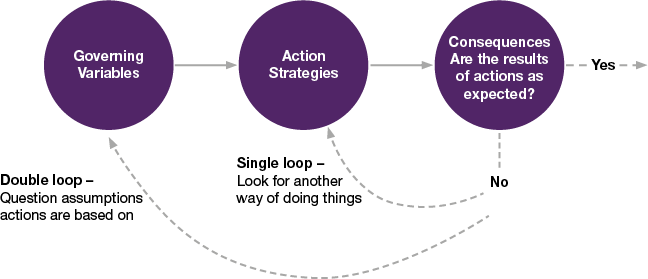Change Selection
01
Please choose a question

ARYGRIS: THEORIES OF ACTION
Double-loop learning and organisational reasoning
Chris Arygris
Arygris believed that we all have theories of action. These are the mental maps
that tell us how to react in any given situation. These mental maps tell us how to
plan and do, and also affect how we see our actions after an event. Our mental
maps are controlled by our governing variables. These are the limits and rules
that we function by. They are influenced by environmental, cultural and our own
internal values.
Argyris believed that there is a mismatch between the things that we actually do
(theory in use), and what we intend to do (espoused theory of use). He suggests
that the best results and most effective actions occur when the espoused theories
of use and theory of use are connected and aligned.
Arygris: Double Loop Learning
A theory to understand how we react when something goes wrong, helping
create a better match between espoused theories of use and theory of use.
Single Loop Learning
When facing a challenge actions work within existing governing variables.
Simply correcting errors in the external environment.
Double Loop Learning
Double Loop Learning questions and changes governing variables through
identifying the ways in which they contribute to problems. This closes the gap
between espoused theory of use and theory in use. (Outcome and intention).

Arygris: Organisational Reasoning
and Theory in Use
Arygris explains that organisations just like individuals have theories of action that are grounded
in culture and practice. How the organisation understands itself, and how it acts, are influenced
by the ‘maps’ of the individuals within the organisation. This is constantly changing.
An organisation can change the maps of the individuals, by changing organisational culture
and understanding through engaging with processes of double loop learning.
Arygris explains that organisations that are good at learning are: organisational 2 learning systems,
that adopt model two reasoning processes. Model two reasoning processes are those that encourage
open questioning and exploration.
On the other hand, organisational 1 learning systems practice model 1 reasoning processes, and
single loop learning. Often covering up actions and seeking external ‘blame’for outcomes.
Chris Argyris, writing in 1977 in the Harvard Business Review, talks further about
double loop learning in organisations. You can read it here.
